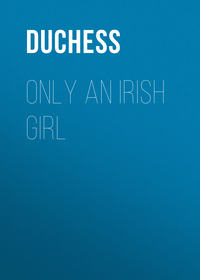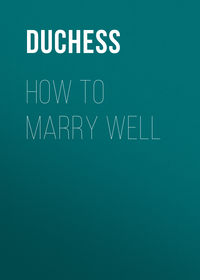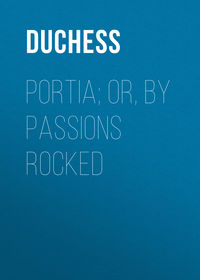 полная версия
полная версияMrs. Geoffrey
"Of course it was a surprise to you," he says.
"It was more than a 'surprise.' That is a mild word," says Lady Rodney. She is looking at him, is telling herself what a goodly son he is, so tall and strong and bright and handsome. He might have married almost any one! And now – now – ? No, she cannot forgive. "It was, and must always be, a lasting grief," she goes on, in a low tone.
This is a bad beginning. Mr. Rodney, before replying, judiciously gains time, and makes a diversion by poking the fire.
"I should have written to you about it sooner," he says at last, apologetically, hoping half his mother's resentment arises from a sense of his own negligence, "but I felt you would object, and so put it off from day to day."
"I heard of it soon enough," returns his mother, gloomily, without lifting her eyes from the tiny feathered fire-screen she is holding. "Too soon! That sort of thing seldom tarries. 'For evil news rides post, while good news baits.'"
"Wait till you see her," says Geoffrey, after a little pause, with full faith in his own recipe.
"I don't want to see her," is the unflinching and most ungracious reply.
"My dear mother, don't say that," entreats the young man, earnestly, going over to her and placing his arm round her neck. He is her favorite son, of which he is quite aware, and so hopes on. "What is it you object to?"
"To everything! How could you think of bringing a daughter-in-law of – of – her description to your mother?"
"How can you describe her, when you have not seen her?"
"She is not a lady," says Lady Rodney, as though that should terminate the argument.
"It entirely depends on what you consider a lady," says Geoffrey, calmly, keeping his temper wonderfully, more indeed for Mona's sake than his own. "You think a few grandfathers and an old name make one: I dare say it does. It ought, you know; though I could tell you of several striking exceptions to that rule. But I also believe in a nobility that belongs alone to nature. And Mona is as surely a gentlewoman in thought and deed as though all the blood of all the Howards was in her veins."
"I did not expect you would say anything else," returns she, coldly. "Is she quite without blood?"
"Her mother was of good family, I believe."
"You believe!" with ineffable disgust. "And have you not even taken the trouble to make sure? How late in life you have developed a trusting disposition!"
"One might do worse than put faith in Mona," says, Geoffrey, quickly. "She is worthy of all trust. And she is quite charming, – quite. And the very prettiest girl I ever saw. You know you adore beauty, mother," – insinuatingly, – "and she is sure to create a furor when presented."
"Presented!" repeats Lady Rodney, in a dreadful tone. "And would you present a low Irish girl to your sovereign? And just now, too, when the whole horrid nation is in such disrepute."
"You mustn't call her names, you know; she is my wife," says Rodney, gently, but with dignity, – "the woman I love and honor most on earth. When you see her you will understand how the word 'low' could never apply to her. She looks quite correct, and is perfectly lovely."
"You are in love," returns his mother, contemptuously. "At present you can see no fault in her; but later on when you come to compare her with the other women in your own set, when you see them together, I only hope you will see no difference between them, and feel no regret."
She says this, however, as though it is her one desire he may know regret, and feel a difference that be overwhelming.
"Thank you," says Geoffrey, a little dryly, accepting her words as they are said, not as he feels they are meant.
Then there is another pause, rather longer than the last, Lady Rodney trifles with the fan in a somewhat excited fashion, and Geoffrey gazes, man-like, at his boots. At last his mother breaks the silence.
"Is she – is she noisy?" she asks, in a faltering tone.
"Well, she can laugh, if you mean that," says Geoffrey somewhat superciliously. And then, as though overcome with some recollection in which the poor little criminal who is before the bar bore a humorous part, he lays his head down upon the mantelpiece and gives way to hearty laughter himself.
"I understand," says Lady Rodney, faintly, feeling her burden is "greater than she can bear." "She is, without telling, a young woman who laughs uproariously, at everything, – no matter what, – and takes good care her vulgarity shall be read by all who run."
Now, I can't explain why but I never knew a young man who was not annoyed when the girl he loved was spoken of as a "young woman." Geoffrey takes it as a deliberate insult.
"There is a limit to everything, – even my patience," he says, not looking at his mother. "Mona is myself, and even from you, my mother, whom I love and reverence, I will not take a disparaging word of her."
There is a look upon his face that recalls to her his dead father, and Lady Rodney grows silent. The husband of her youth had been dear to her, in a way, until age had soured him, and this one of all his three children most closely resembled him, both in form and in feature; hence, perhaps, her love for him. She lowers her eyes, and a slow blush – for the blood rises with difficulty in the old – suffuses her face.
And then Geoffrey, marking all this, is vexed within himself, and, going over to her, lays his arm once more around her neck, and presses his cheek to hers.
"Don't let us quarrel," he says, lovingly. And this time she returns his caress very fondly, though she cannot lose sight of the fact that he has committed a social error not to be lightly overlooked.
"Oh, Geoffrey, how could you do it?" she says, reproachfully, alluding to his marriage, – "you whom I have so loved. What would your poor father have thought had he lived to see this unhappy day? You must have been mad."
"Well, perhaps I was," says Geoffrey, easily: "we are all mad on one subject or another, you know; mine may be Mona. She is an excuse for madness, certainly. At all events, I know I am happy, which quite carries out your theory, because, as Dryden says, —
'There is a pleasure sureIn being mad, which none but madmen know.'I wish you would not take it so absurdly to heart. I haven't married an heiress, I know; but the whole world does not hinge on money."
"There was Violet," says Lady Rodney.
"I wouldn't have suited her at all," says Geoffrey. "I should have bored her to extinction, even if she had condescended to look at me, which I am sure she never would."
He is not sure of anything of the kind, but he says it nevertheless, feeling he owes so much to Violet, as the conversation has drifted towards her, and he feels she is placed – though unknown to herself – in a false position.
"I wish you had never gone to Ireland!" says Lady Rodney, deeply depressed. "My heart misgave me when you went, though I never anticipated such a climax to my fears. What possessed you to fall in love with her?"
"'She is pretty to walk with,And witty to talk with,And pleasant, too, to think on.'"quotes Geoffrey, lightly, "Are not these three reasons sufficient? If not, I could tell you a score of others. I may bring her down to see you?"
"It will be very bitter to me," says Lady Rodney.
"It will not: I promise you that; only do not be too prejudiced in her disfavor. I want you to know her, – it is my greatest desire, – or I should not say another word after your last speech, which is not what I hoped to hear from you. Leighton, as you know, is out of repair, but if you will not receive us we can spend the rest of the winter at Rome or anywhere else that may occur to us."
"Of course you must come here," says Lady Rodney, who is afraid of the county and what it will say if it discovers she is at loggerheads with her son and his bride. But there is no welcome in her tone. And Geoffrey, greatly discouraged, yet determined to part friends with her for Mona's sake, – and trusting to the latter's sweetness to make all things straight in the future, – after a few more desultory remarks takes his departure, with the understanding on both sides that he and his wife are to come to the Towers on the Friday following to take up their quarters there until Leighton Hall is ready to receive them.
With mingled feelings he quits his home, and all the way up to London in the afternoon train weighs with himself the momentous question whether he shall or shall not accept the unwilling invitation to the Towers, wrung from his mother.
To travel here and there, from city to city and village to village, with Mona, would be a far happier arrangement. But underlying all else is a longing that the wife whom he adores and the mother whom he loves should be good friends.
Finally, he throws up the mental argument, and decides on letting things take their course, telling himself it will be a simple matter to leave the Towers at any moment, should their visit there prove unsatisfactory. At the farthest, Leighton must be ready for them in a month or so.
Getting back to the Grosvenor, he runs lightly up the stairs to the sitting-room, and, opening the door very gently, – bent in a boyish fashion on giving her a "rise," – enters softly, and looks around for his darling.
At the farthest end of the room, near a window, lying back in an arm-chair, lies Mona, sound asleep.
One hand is beneath her cheek, – that is soft and moist as a child's might be in innocent slumber, – the other is thrown above her head. She is exquisite in her abandon, but very pale, and her breath comes unevenly.
Geoffrey, stooping over to wake her with a kiss, marks all this, and also that her eyelids are tinged with pink, as though from excessive weeping.
Half alarmed, he lays his hand gently on her shoulder, and, as she struggles quickly into life again, he draws her into his arms.
"Ah, it is you!" cries she, her face growing glad again.
"Yes; but you have been crying, darling! What has happened?"
"Oh, nothing," says Mona, flushing. "I suppose I was lonely. Don't mind me. Tell me all about yourself and your visit."
"Not until you tell me what made you cry."
"Sure you know I'd tell you if there was anything to tell," replies she, evasively.
"Then do so," returns he, quite gravely, not to be deceived by her very open attempts at dissimulation. "What made you unhappy in my absence?"
"If you must know, it is this," says Mona, laying her hand in his and speaking very earnestly. "I am afraid I have done you an injury in marrying you!"
"Now, that is the first unkind thing you have ever said to me," retorts he.
"I would rather die than be unkind to you," says Mona, running her fingers with a glad sense of appropriation through his hair. "But this is what I mean; your mother will never forgive your marriage; she will not love me, and I shall be the cause of creating dissension between her and you." Again tears fill her eyes.
"But there you are wrong. There need be no dissensions; my mother and I are very good friends, and she expects us both to go to the Towers on Friday next."
Then he tells her all the truth about his interview with his mother, only suppressing such words as would be detrimental to the cause he has in hand, and might give her pain.
"And when she sees you all will be well," he says, still clinging bravely to his faith in this panacea for all evils. "Everything rests with you.'
"I will do my best," says Mona, earnestly; "but if I fail, – if after all my efforts your mother still refuses to love me, how will it be then?"
"As it is now; it need make no difference to us; and indeed I will not make the trial at all if you shrink from it, or if it makes you in the faintest degree unhappy."
"I do not shrink from it," replies she, bravely: "I would brave anything to be friends with your mother."
"Very well, then: we will make the attempt," says he, gayly. "'Nothing venture, nothing have.'"
"And 'A dumb priest loses his benefice,'" quotes Mona, in her turn, almost gayly too.
"Yet remember, darling, whatever comes of it," says Rodney, earnestly, "that you are more to me than all the world, – my mother included. So do not let defeat – if we should be defeated – cast you down. Never forget how I love you." In his heart he dreads for her the trial that awaits her.
"I do not," she says, sweetly. "I could not: it is my dearest remembrance; and somehow it has made me strong to conquer, Geoffrey," – flushing, and raising herself to her full height, as though already arming for action, – "I feel, I know, I shall in the end succeed with your mother."
She lifts her luminous eyes to his, and regards him fixedly as she speaks, full of hopeful excitement. Her eyes have always a peculiar fascination of their own, apart from the rest of her face. Once looking at her, as though for the first time impressed with this idea, Geoffrey had said to her, "I never look at your eyes that I don't feel a wild desire to close them with a kiss." To which she had made answer in her little, lovable way, and with a bewitching glance from the lovely orbs in question, "If that is how you mean to do it, you may close them just as often as ever you like."
Now he takes advantage of this general permission, and closes them with a soft caress.
"She must be harder-hearted than I think her, if she can resist you," he says, fondly.
CHAPTER XVI
HOW GEOFFREY AND MONA ENTER THE TOWERS – AND HOW THEY ARE RECEIVED BY THE INHABITANTS THEREOF
The momentous Friday comes at last, and about noon Mona and Geoffrey start for the Towers. They are not, perhaps, in the exuberant spirits that should be theirs, considering they are going to spend their Christmas in the bosom of their family, – at all events, of Geoffrey's family which naturally for the future she must acknowledge as hers. They are indeed not only silent, but desponding, and as they get out of the train at Greatham and enter the carriage sent by Sir Nicholas to meet them their hearts sink nearly into their boots, and for several minutes no words pass between them.
To Geoffrey perhaps the coming ordeal bears a deeper shade; as Mona hardly understands all that awaits her. That Lady Rodney is a little displeased at her son's marriage she can readily believe, but that she has made up her mind beforehand to dislike her, and intends waging with her war to the knife, is more than has ever entered into her gentle mind.
"Is it a long drive, Geoff?" she asks, presently, in a trembling tone, slipping her hand into his in the old fashion. "About six miles. I say, darling, keep up your spirits; if we don't like it, we can leave, you know. But" – alluding to her subdued voice – "don't be imagining evil."
"I don't think I am," says Mona; "but the thought of meeting people for the first time makes me feel nervous. Is your mother tall, Geoffrey?"
"Very."
"And severe-looking? You said she was like you."
"Well, so she is; and yet I suppose our expressions are dissimilar. Look here," says Geoffrey, suddenly, as though compelled at the last moment to give her a hint of what is coming. "I want to tell you about her, – my mother I mean: she is all right, you know, in every way, and very charming in general, but just at first one might imagine her a little difficult!"
"What's that?" asked Mona. "Don't speak of your mother as if she were a chromatic scale."
"I mean she seems a trifle cold, unfriendly, and – er – that," says Geoffrey. "Perhaps it would be a wise thing for you to make up your mind what you will say to her on first meeting her. She will come up to you, you know, and give you her hand like this," taking hers, "and – "
"Yes, I know," said Mona, eagerly interrupting him. "And then she will put her arms round me, and kiss me just like this," suiting the action to the word.
"Like that? Not a bit of it," says Geoffrey, who had given her two kisses for her one: "you mustn't expect it. She isn't in the least like that. She will meet you probably as though she saw you yesterday, and say, 'How d'ye do? I'm afraid you have had a very long and cold drive.' And then you will say – "
A pause.
"Yes, I shall say – " anxiously.
"You – will – say – " Here he breaks down ignominiously, and confesses by his inability to proceed that he doesn't in the least know what it is she can say.
"I know," says Mona, brightening, and putting on an air so different from her own usual unaffected one as to strike her listener with awe. "I shall say, 'Oh! thanks, quite too awfully much, don't you know? but Geoffrey and I didn't find it a bit long, and we were as warm as wool all the time.'"
At this appalling speech Geoffrey's calculations fall through, and he gives himself up to undisguised mirth.
"If you say all that," he says, "there will be wigs on the green: that's Irish, isn't it? or something like it, and very well applied too. The first part of your speech sounded like Toole or Brough, I'm not sure which."
"Well, it was in a theatre I heard it," confesses Mona, meekly: "it was a great lord who said it on the stage, so I thought it would be all right."
"Great lords are not necessarily faultlessly correct, either on or off the stage," says Geoffrey. "But, just for choice, I prefer them off it. No, that will not do at all. When my mother addresses you, you are to answer her back again in tones even colder than her own, and say – "
"But, Geoffrey, why should I be cold to your mother? Sure you wouldn't have me be uncivil to her, of all people?"
"Not uncivil, but cool. You will say to her, 'It was rather better than I anticipated, thank you.' And then, if you can manage to look bored, it will be quite correct, so far, and you may tell yourself you have scored one."
"I may say that horrid speech, but I certainly can't pretend I was bored during our drive, because I am not," says Mona.
"I know that. If I was not utterly sure of it I should instantly commit suicide by precipitating myself under the carriage-wheels," says Geoffrey. "Still – 'let us dissemble.' Now say what I told you."
So Mrs. Rodney says, "It was rather better than I anticipated, thank you," in a tone so icy that his is warm beside it.
"But suppose she doesn't say a word about the drive?" says Mona, thoughtfully. "How will it be then?"
"She is safe to say something about it, and that will do for anything," says Rodney, out of the foolishness of his heart.
And now the horses draw up before a brilliantly-lighted hall, the doors of which are thrown wide as though in hospitable expectation of their coming.
Geoffrey, leading his wife into the hall, pauses beneath a central swinging lamp, to examine her critically. The footman who is in attendance on them has gone on before to announce their coming: they are therefore for the moment alone.
Mona is looking lovely, a little pale perhaps from some natural agitation, but her pallor only adds to the lustre of her great blue eyes and lends an additional sweetness to the ripeness of her lips. Her hair is a little loose, but eminently becoming, and altogether she looks as like an exquisite painting as one can conceive.
"Take off your hat," says Geoffrey, in a tone that gladdens her heart, so full it is of love and admiration; and, having removed her hat, she follows him though halls and one or two anterooms until they reach the library, into which the man ushers them.
It is a very pretty room, filled with a subdued light, and with a blazing fire at one end. All bespeaks warmth, and home, and comfort, but to Mona in her present state it is desolation itself. The three occupants of the room rise as she enters, and Mona's heart dies within her as a very tall statuesque woman, drawing herself up languidly from a lounging-chair, comes leisurely up to her. There is no welcoming haste in her movements, no gracious smile, for which her guest is thirsting, upon her thin lips.
She is dressed in black velvet, and has a cap of richest old lace upon her head. To the quick sensibilities of the Irish girl it becomes known without a word that she is not to look for love from this stately woman, with her keen scrutinizing glance and cold unsmiling lips.
A choking sensation, rising from her heart, almost stops Mona's breath; her mouth feels parched and dry; her eyes widen. A sudden fear oppresses her. How is it going to be in all the future? Is Geoffrey's – her own husband's – mother to be her enemy?
Lady Rodney holds out her hand, and Mona lays hers within it.
"So glad you have come," says Lady Rodney, in a tone that belies her words, and in a sweet silvery voice that chills the heart of her listener. "We hardly thought we should see you so soon, the trains here are so unpunctual. I hope the carriage was in time?"
She waits apparently for an answer, at which Mona grows desperate. For in reality she has heard not one word of the labored speech made to her, and is too frightened to think of anything to say except the unfortunate lesson learned in the carriage and repeated secretly so often since. She looks round helplessly for Geoffrey; but he is laughing with his brother, Captain Rodney, whom he has not seen since his return from India, and so Mona, cast upon her own resources, says, —
"It was rather better than I anticipated, thank you," not in the haughty tone adopted by her half an hour ago, but, in an unnerved and frightened whisper.
At this remarkable answer to a very ordinary and polite question, Lady Rodney stares at Mona for a moment, and then turns abruptly away to greet Geoffrey. Whereupon Captain Rodney, coming forward, tells Mona he is glad to see her, kindly but carelessly; and then a young man, who has been standing up to this silently upon the hearthrug, advances, and takes Mona's hand in a warm clasp, and looks down upon her with very friendly eyes.
At his touch, at his glance, the first sense of comfort Mona has felt since her entry into the room falls upon her. This man, at least, is surely of the same kith and kin as Geoffrey, and to him her heart opens gladly, gratefully.
He has heard the remarkable speech made to his mother, and has drawn his own conclusions therefrom. "Geoffrey has been coaching the poor little soul, and putting absurd words into her mouth, with – as is usual in all such cases – a very brilliant result." So he tells himself, and is, as we know, close to the truth.
He tells Mona she is very welcome, and, still holding her hand, draws her over to the fire, and moves a big arm-chair in front of it, in which he ensconces her, bidding her warm herself, and make herself (as he says with a kindly smile that has still kinder meaning in it) "quite at home."
Then he stoops and unfastens her sealskin jacket, and takes it off her, and in fact pays her all the little attentions that lie in his power.
"You are Sir Nicholas?" questions she at last, gaining courage to speak, and raising her eyes to his full of entreaty, and just a touch of that pathos that seems of right to belong to the eyes of all Irishwomen.
"Yes," returns he with a smile. "I am Nicholas." He ignores the formal title. "Geoffrey, I expect, spoke to you of me as 'old Nick;' he has never called me anything else since we were boys."
"He has often called you that; but," – shyly, – "now that I have seen you, I don't think the name suits you a bit."
Sir Nicholas is quite pleased. There is a sort of unconscious flattery in the gravity of her tone and expression that amuses almost as much as it pleases him. What a funny child she is! and how unspeakably lovely! Will Doatie like her?
But there is yet another introduction to be gone through. From the doorway Violet Mansergh comes up to Geoffrey clad in some soft pale shimmering stuff, and holds out to him her hand.
"What a time you have been away!" she says, with a pretty, slow smile, that has not a particle of embarrassment or consciousness in it, though she is quite aware that Jack Rodney is watching her closely. Perhaps, indeed, she is secretly amused at his severe scrutiny.
"You will introduce me to your wife?" she asks, after a few minutes, in her even, trainante voice, and is then taken up to the big arm-chair before the fire, and is made known to Mona.
"Dinner will be ready in a few minutes: of course we shall excuse your dressing to-night," says Lady Rodney, addressing her son far more than Mona, though the words presumably are meant for her. Whereupon Mona, rising from her chair with a sigh of relief, follows Geoffrey out of the room and upstairs.









